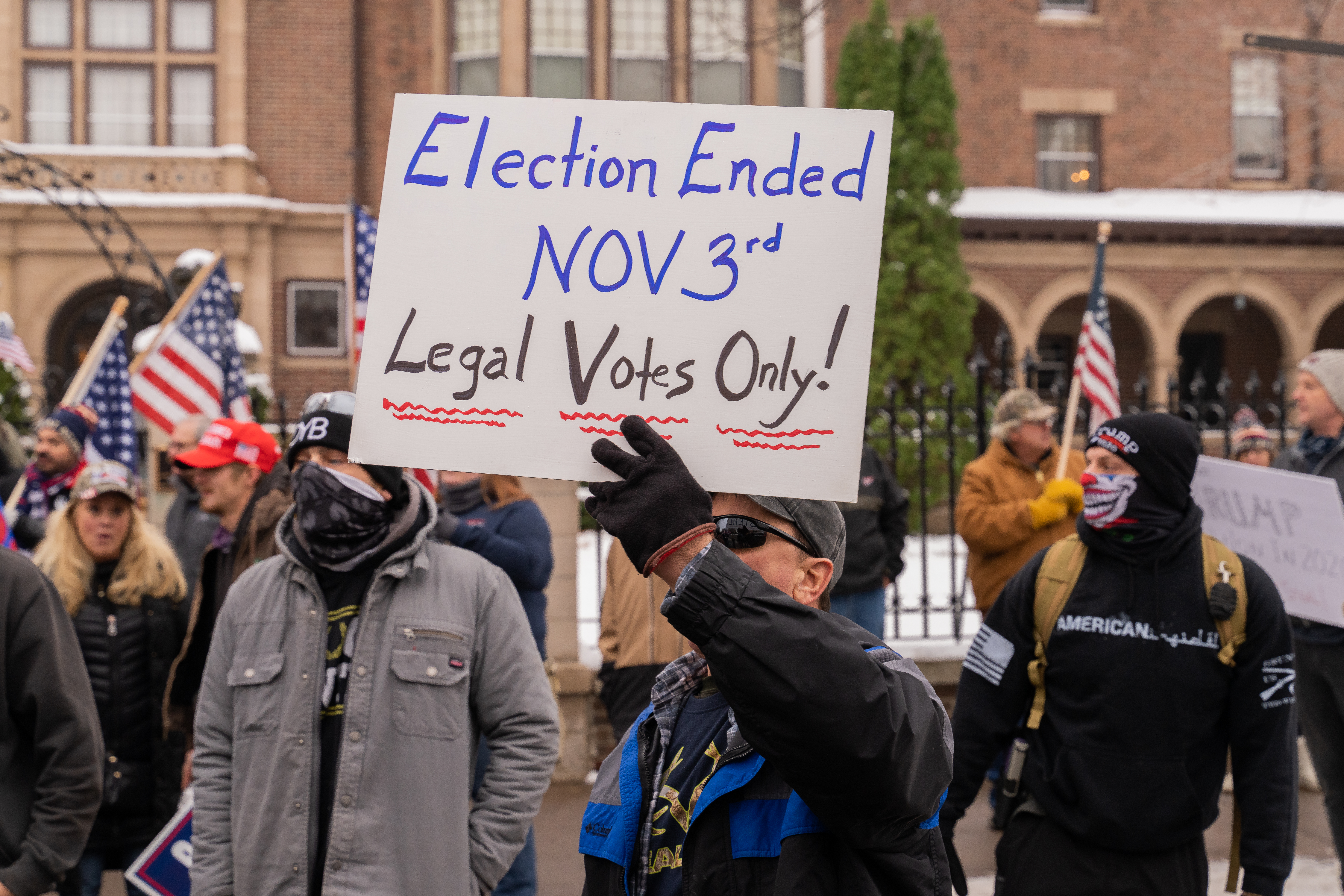Tolling the Statute of Limitations to Prosecute a Former President: A Double-Edged Sword
The preservation of democracy requires that prosecutors have the ability to investigate and indict a sitting president when the president commits crimes. The Protecting Our Democracy Act is an important step toward curtailing unfettered presidential power.

Published by The Lawfare Institute
in Cooperation With

House Democrats on Sept. 21 introduced the Protecting Our Democracy Act, a bill designed to prevent presidential abuses of power and strengthen various counterweights to presidential authority. The bill limits the reach of the pardon power by prohibiting self-pardons and clarifying that a president who exercises a pardon in exchange for political favors may be guilty of bribery. The bill also provides specific procedures for enforcing the foreign and domestic emoluments clauses of the Constitution, and it strengthens the degree to which members of Congress can bring civil actions to enforce these prohibitions. The bill further cabins presidential authority by reducing the president’s ability to misuse his emergency power under the 1976 National Emergencies Act, and it strengthens Congress’s ability to enforce lawfully issued subpoenas and empowers courts to levy fines on government officials who willfully fail to comply with congressional subpoenas.
In an important provision, the Protecting Our Democracy Act would extend the statute of limitations for crimes committed by the president and the vice president. Section 202 of the bill, which amends 18 U.S.C. § 3282(c), appears to strike a blow for presidential accountability, but on closer inspection it does precisely the opposite. By tolling the statute of limitations during a president’s term in office, the bill would lend indirect support to the claim that a sitting president cannot be indicted or even investigated for a crime while in office. As we argue in a forthcoming article, the preservation of democracy requires that prosecutors have the ability to investigate and indict a sitting president when the president commits crimes. Waiting to prosecute until the president leaves office, or worse, declining to prosecute altogether, may incentivize the president to commit crimes while in office, particularly crimes designed to increase his chances of remaining in office, whether in the run-up to an election or in its aftermath.
Two types of arguments are typically offered for the claim that a sitting president cannot be indicted. The first is a textual argument that focuses on the Impeachment Clause of Article I of the Constitution (emphasis added):
Judgment in Cases of Impeachment shall not extend further than to removal from Office, and disqualification to hold and enjoy any Office of honor, Trust or Profit under the United States: but the Party convicted shall nevertheless be liable and subject to Indictment, Trial, Judgment and Punishment, according to Law.
Some scholars interpret the italicized words as meaning that the president must first be impeached, tried in the Senate and “convicted” before he can be subject to criminal process. They therefore believe that the Impeachment Clause precludes the indictment of any president who has not already been impeached and removed.
This interpretation is problematic for two reasons. First, the text does not actually rule out prosecution before impeachment. It merely points out one instance in which a party may be convicted following impeachment. Second, the Impeachment Clause extends to federal officers other than presidents, including cabinet officials and federal judges. Under this interpretation of Article 1, Section 3, none of these civil officers could be indicted for a crime until they were impeached by the House and convicted by the Senate. As we know, this has not been the practice.
The second and more common sort of argument against presidential indictment is structural. The argument is that indicting a sitting president would violate separation of powers by unduly interfering with the president’s duties. This was the conclusion of the Office of Legal Counsel (OLC) in 1973, at the height of the Watergate scandal, and again in 2000, two years after the investigation of President Clinton by special counsel Ken Starr for Clinton’s affair with Monica Lewinsky. But, as we explain in our article, and as has been argued on Lawfare, the OLC opinions have serious flaws, especially given that the Supreme Court has repeatedly affirmed the legality of burdensome legal process against a sitting president. United States v. Nixon upheld a Justice Department special prosecutor’s subpoena to President Nixon to produce White House tape recordings of his phone calls. And Clinton v. Jones held that a sitting president could be sued for tortious acts performed in his personal capacity before he assumed office.
The Supreme Court’s most recent case on presidential investigations, Trump v. Vance, further supports the argument that a sitting president can be criminally indicted. That case arose out of a New York grand jury subpoena for President Trump’s financial records from his former accounting firm, Mazars. Trump, with the support of the solicitor general, argued that the president is immune from criminal investigation, and that therefore Mazars did not have to answer to a state grand jury subpoena. In oral argument in the U.S. Court of Appeals for the Second Circuit in that case, Trump’s lawyers took the assertion of presidential immunity to its extreme, going so far as to argue that the president could literally shoot someone on Fifth Avenue and still be immune from investigation or prosecution until after leaving office. The majority rightly rejected this argument, including the solicitor general’s argument that presidential subpoenas should be judged by a heightened standard. None of the justices, not even Justices Clarence Thomas and Samuel Alito in dissent, accepted Trump’s broad claim of absolute immunity, and on that point the decision was unanimous. While Vance did not directly address the question whether an investigation of the president can constitutionally progress to indictment, as we have argued elsewhere, Vance , along with Nixon and Jones, provides further support for the suggestion that a sitting president can be criminally investigated.
Waiting to prosecute a criminal president until after he leaves office is also inconsistent with the court’s holding in Vance that “no man is above the law,” given that waiting to prosecute may lead to no prosecution at all. At least at the federal level, deferred prosecution puts the burden on a new administration, which may be reluctant to engage in an investigation and prosecution of a member of the former administration. Such proceedings risk alienating voters who continue to support the former corrupt leader, and they take time and energy away from the new administration’s current priorities as well. The president who is not prosecuted while in office will likely never be prosecuted at all.
Even if the next administration can be trusted to investigate and prosecute a past criminal president, this is insufficient to deter presidential crime, since it fails to address the most fundamental danger to democracy, namely that a president who is immune to criminal liability has every incentive to commit crimes to avoid having to leave office. If a sitting president can commit crimes with impunity, he may well have the motive and opportunity to commit crimes for the very purpose of undermining attempts to hold him to account. A criminally immune president can obstruct justice in any investigation that could lead to his impeachment, perhaps even bribing representatives not to impeach him and manipulating senators not to convict him.
Perhaps most alarmingly, such a president can also obstruct elections, by bribing or coercing foreign powers to interfere or inducing state election officials to manufacture additional votes or insisting that election officials “decertify” the election long after the results of the election have been definitively settled. In the most extreme case, this downward spiral of presidential criminality can lead to outright authoritarianism. If the president were to enlist assassins to kill his political opponents or witnesses of his wrongdoing, should investigations of those crimes only begin at the end of the president’s term? If so, the president’s term may never end, or the president may commit additional crimes to install a new president who grants a pardon or promises not to prosecute. Presidential crimes must be addressed as close to the time they occur as possible, or the momentum they create can send a nation down a path of criminality and corruption.
Presidential criminality is not a hypothetical concern. The world is increasingly learning of the lengths that Trump and his campaign went to in order to secure a second term. When defeat became imminent and even after Biden’s victory was clear, Trump resorted to increasingly desperate, dangerous and anti-democratic measures to reverse the results of the election. In November 2020, for example, there was serious discussion in the Oval Office of using the military to reverse the presidential election, a meeting that by itself, we have argued, could constitute seditious conspiracy. This was followed by President Trump’s repeated baseless claims of “election fraud,” leading up to Jan. 6, when an angry mob invaded the U.S. Capitol Building during the counting of the Electoral College votes and sought to halt the certification as well as to do violence to the vice president and the speaker of the House, among others. We do not address here whether Trump was criminally responsible for the events of that day, though emerging evidence increasingly suggests direct White House involvement. But we can all now imagine how a defeated occupant of the Oval Office might attempt to lead his followers into a violent attempt to oppose the transition of power and refuse to cede control to his duly elected successor.
Given the legal and policy reasons to permit the criminal indictment of a sitting president, we believe that Congress should revise Section 202 of the Protecting Our Democracy Act to make clear that it is not unconstitutional to indict a sitting president, as well as to affirm the vital role that even-handed application of the criminal law and holding government officials to the rule of law plays in protecting democracy. To dispel any impression that Congress intends to endorse presidential immunity from prosecution, the proposed bill could be amended by adding the following provision:
The Department of Justice may seek criminal indictments of executive branch officials within the scope of their authority and shall not postpone post-indictment proceedings based on the identity of the defendant as an elected or appointed official of the United States or territory, to include the president and vice president of the United States. Procedural accommodations in a criminal case specifically involving the president or vice president shall be limited to those necessary to perform his or her duties.
If there is one enduring truth that has emerged from the Trump presidency, it is that unfettered presidential power poses a profound threat to U.S. democracy. Trump was not the first president to abuse presidential authority, nor will he likely be the last. It is critical for the survival of U.S. democracy that the distribution of power be rebalanced among the branches of the federal government. The place to start is to enhance the guardrails on the executive branch. No president will voluntarily agree to limit his own authority. But Congress can and should make it clear that no person, even a sitting president, is beyond the reach of the criminal law, an affirmation that would bring the Protecting Our Democracy Act into alignment with Supreme Court precedent and the rule of law






